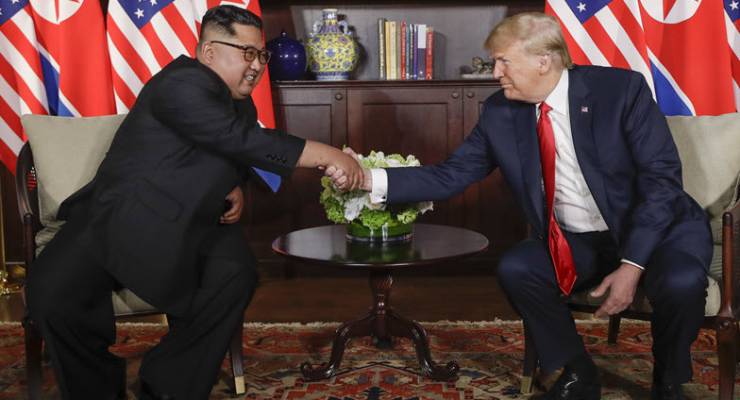
The fact that President Trump and North Korean leader Kim Jong-un have engaged in talks this morning means this meeting will already be deemed a success. All they have to do now is walk away saying they have agreed in principle to some relatively low-level matters and leave the details to their officials.
Much of the content of the meeting will have already been addressed in preliminary discussions between US and North Korean representatives. So long as the two leaders can stay on script, the process should proceed without problem.
The major concern, with Trump in particular, is that he will go off-script, as he has done so often before. However, wading into a complex discussion with no meaningful prior knowledge means he will, on this occasion, likely be cautious.
[Trump’s ‘dumb luck’ decision-making may not last]
Perhaps the best outcome that could be achieved from the summit is that both leaders agree to end the Korean War which, since 1953, has remained in a state of armistice. A formal end to the war would also require the involvement of South Korea and need to be ratified by the United Nations, given it authorised the force that entered the war in support of South Korea.
An end to the war would likely require North Korea to limit military manoeuvers and end missile testing, while South Korea and the US would have to agree to limit or cease their own military exercises. The assertiveness of the South Korea-US military exercises have been a key impediment in negotiations in the past, including in the lead-up to this summit.
More likely, then, would be a further extension of the family reunion program across the North-South Korean border. North Korea may need to promise the return of 17 Japanese citizens who were kidnapped to support the country’s foreign language program, and many more South Koreans kidnapped for their technical skills.
North Korea will also be looking for security guarantees. China could play a key role here, as North Korea’s principal backer. The removal of US forces from South Korea is, however, unlikely to be accepted outside of a denuclearisation agreement.
As for the much vaunted denuclearisation of the Korean Peninsula, this could potentially follow a formal end to the Korean War, given that its initial rationale for nuclearisation will have been resolved. However, denuclearisation is a vastly more complex issue than formalising the effective status quo.
What is meant by “de-nuclearisation” is itself a moot point. North Korea might, for example, seek to retain a nuclear enrichment capacity for civilian energy purposes. The US, or China, would then counter this by offering to provide enriched nuclear material to remove North Korea’s capacity for future nuclear weapons development.
An independent inspections regime could also be a difficult point of negotiation, given it would require North Korea’s collective leadership to allow external monitors into the secretive country’s most secret facilities. Of particular concern, as of all other weapons inspection processes, would be whether the inspectors have complete access to all facilities, or whether some facilities would remain hidden.
But these are matters are for the future. So long as Trump and Kim Jong-un can walk out of their meeting smiling and agree to shake hands then it will be deemed a success. If they can make an announcement, even on a relatively minor agreement, that would be an added bonus.
If the summit succeeds in its basic aims, Trump will have achieved a great deal through his unconventional style. As for Kim Jong-un, the leader of an impoverished nation of some 25 million will have elevated himself onto the world stage, speaking as an equal to a person whose office is commonly described as being the most powerful in the world.
Damien Kingsbury is Deakin University’s Professor of International Politics.








I think one thing is for certain. No matter the outcome, Trump will claim it as the successiest success of all time, ever. Something the likes no other person in history has achieved.
What will a fail look/sound like?
A G6 + 1
I was particularly fond of a remark made a couple of weeks ago by Bolton – or perhaps one of other, many, headbangers swirling around the Drumpfster – that “the S Korean President had no role to play in these talks“.
Nemesis is never far behind Hubris.
I hope there is no real chance that Trump will sell its allies all down the river and agree to the formal end of the Korean War and the withdrawal of all US forces from South Korea. Presumably that is what China wants. The lack of effective
legislative restraints upon the individual power of the US president are frankly terrifying now that this particular person is the President of the United States.
The meeting is window dressing. There is a real story somewhere: another harvest failure, space weapons, ….?